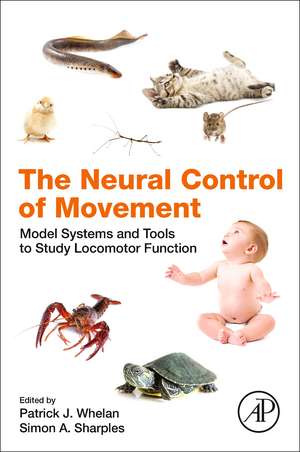The Neural Control of Movement: Model Systems and Tools to Study Locomotor Function
Editat de Patrick J. Whelan, Simon A. Sharplesen Limba Engleză Paperback – 5 feb 2021
The Neural Control of Movement discusses these developments across a variety of species including man. The editors focus on highlighting the utility of different models from invertebrates to vertebrates. Each chapter discusses how new approaches in neuroscience are being used to dissect and control neural networks. An area of emphasis is on vertebrate motor networks and particularly the spinal cord. The spinal cord is unique because it has seen the use of genetic tools allowing the dissection of networks for over ten years. This book provides practical details on model systems, approaches, and analysis approaches related to movement control. This book is written for neuroscientists interested in movement control.
- Provides practice details on model systems, approaches, and analysis approaches related to movement control
- Discusses how recent advances like optogenetics and chemogenetics affect the need for model systems to be modified (or not) to work for studies of movement and motor control
- Written for neuroscientists interested in movement control, especially movement disorders like Parkinson’s, MS, spinal cord injury, and stroke
Preț: 915.66 lei
Preț vechi: 1266.00 lei
-28% Nou
Puncte Express: 1373
Preț estimativ în valută:
175.23€ • 190.28$ • 147.20£
175.23€ • 190.28$ • 147.20£
Carte tipărită la comandă
Livrare economică 16-30 aprilie
Livrare express 18-22 martie pentru 98.96 lei
Preluare comenzi: 021 569.72.76
Specificații
ISBN-13: 9780128164778
ISBN-10: 0128164778
Pagini: 484
Dimensiuni: 152 x 229 x 28 mm
Greutate: 0.76 kg
Editura: ELSEVIER SCIENCE
ISBN-10: 0128164778
Pagini: 484
Dimensiuni: 152 x 229 x 28 mm
Greutate: 0.76 kg
Editura: ELSEVIER SCIENCE
Public țintă
neuroscientists and advanced graduate students interested in movement controlCuprins
Section A. Invertebrates
1. Elegantly
2. Small steps and larger strides in understanding the neural bases of crawling in the medicinal leech
3. Studying the neural basis of animal walking in the stick insect
4. Neural control of flight in locusts
Section B. Vertebrates
5. Neural control of swimming in lampreys
6. Toward a comprehensive model of circuits underlying locomotion: What did we learn from zebrafish?
7. Neural control of swimming in hatchling Xenopus frog tadpoles
8. Xenopus frog metamorphosis: A model for studying locomotor network development and neuromodulation
9. The turtle as a model for spinal motor circuits
10. Development of the locomotor system - Chick embryo
11. Using mouse genetics to study the developing spinal locomotor circuit
12. Using mouse genetics to investigate supraspinal pathways of the brain important to locomotion
13. Fundamental contributions of the cat model to the neural control of locomotion
14. The micropig model of neurosurgery and spinal cord injury in experiments of motor control.
15. What lies beneath the brain: Neural circuits involved in human locomotion
16. A tale of many models. Which one creates the best of times?
1. Elegantly
2. Small steps and larger strides in understanding the neural bases of crawling in the medicinal leech
3. Studying the neural basis of animal walking in the stick insect
4. Neural control of flight in locusts
Section B. Vertebrates
5. Neural control of swimming in lampreys
6. Toward a comprehensive model of circuits underlying locomotion: What did we learn from zebrafish?
7. Neural control of swimming in hatchling Xenopus frog tadpoles
8. Xenopus frog metamorphosis: A model for studying locomotor network development and neuromodulation
9. The turtle as a model for spinal motor circuits
10. Development of the locomotor system - Chick embryo
11. Using mouse genetics to study the developing spinal locomotor circuit
12. Using mouse genetics to investigate supraspinal pathways of the brain important to locomotion
13. Fundamental contributions of the cat model to the neural control of locomotion
14. The micropig model of neurosurgery and spinal cord injury in experiments of motor control.
15. What lies beneath the brain: Neural circuits involved in human locomotion
16. A tale of many models. Which one creates the best of times?
